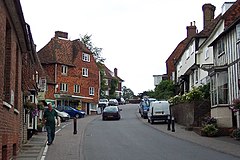Goudhurst, Kent
| Goudhurst | |
|---|---|
 High Street, Goudhurst |
|
|
Goudhurst shown within Kent
|
|
| Population | 3,204 3,327 (2011 Census) (Parish includes villages of Horden and Kilndown) |
| OS grid reference | TQ725375 |
| Civil parish |
|
| District | |
| Shire county | |
| Region | |
| Country | England |
| Sovereign state | United Kingdom |
| Post town | CRANBROOK |
| Postcode district | TN17 |
| Dialling code | 01580 |
| Police | Kent |
| Fire | Kent |
| Ambulance | South East Coast |
| EU Parliament | South East England |
| UK Parliament | |
Goudhurst is a village in Kent on the Weald, about 12 miles (19 km) south of Maidstone. It stands on a crossroads (A262 & B2079), where there is a large village pond. It is also in the Cranbrook School catchment area.
The parish consists of three wards: Goudhurst, Kilndown and Curtisden Green. Hamlets include Bedgebury Cross, Iden Green, Stonecrouch and Winchet Hill.
The word Goudhurst is derived from Goud Hurst, the "Good Hurst" (an opening in a forest) due to the hills strategic position within the local landscape. A less plausible (but attractive) derivation is the Old English guo hyrst, meaning Battle Hill, or the wooded hill on which a battle has been fought. The name apparently commemorates a battle fought on this high ground in Saxon times. The spelling has evolved over the centuries: Gmthhyrste (c. 1100), Guthurst or Guhthersts (c. 1200), Gudhersts (1232), Guthhurste (1278), Goutherst (1316), Goodherst (1610), then the current-day spelling.
The village was one of those involved in the Wealden iron industry; it was a centre for the growing of hops and for weaving. A group of weavers' cottages stands opposite the church.
The Battle of Goudhurst in 1747 led to the end of the Hawkhurst Gang of smugglers.
The village's recent history is extremely well documented. The Goudhurst Jubilee Book (1935), Goudhurst Coronation Book (1937) and Goudhurst and Kilndown Millennium Book (2001, ISBN ) contain detailed reminiscences, directories, historical notes, matters of local intelligence and records of celebrations starting from the 1800s and before, up to the current time. These books were printed as limited editions and are much sought after, as the authors painstakingly recorded not only the written but also the oral history of the village.
...
Wikipedia

